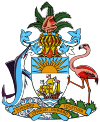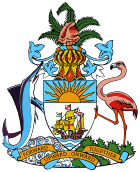Governor-General of the Bahamas
| Governor-General of The Bahamas | |
|---|---|
 | |
 | |
since 1 September 2023 | |
| Viceroy | |
| Style | |
| Residence | Government House, Nassau |
| Appointer | Monarch of The Bahamas on the advice of the prime minister |
| Term length | At His Majesty's pleasure |
| Constituting instrument | Constitution of The Bahamas |
| Formation | 10 July 1973 |
| First holder | Sir John Paul |
| Deputy | Ruby Ann Darling |
| Salary | 37,000 BSD annually |
 |
|---|
|
|
The governor-general of The Bahamas is the representative of the Bahamian monarch, currently King Charles III, in the Commonwealth of The Bahamas. The governor-general is appointed by the monarch on the recommendation of the prime minister of The Bahamas. The functions of the governor-general include appointing ministers, judges, and ambassadors; giving royal assent to legislation passed by parliament; issuing writs for election.
In general, the governor-general observes the conventions of the Westminster system and responsible government, maintaining political neutrality, and has to always act only on the advice of the prime minister. The governor-general also has a ceremonial role: hosting events at the official residence—Government House in the capital, Nassau—and bestowing honours to individuals and groups who are contributing to The Bahamas and to their communities. When travelling abroad, the governor-general is seen as the representative of The Bahamas and its monarch. The governor-general is supported by a staff headed by the official secretary to the governor-general.
Governors-general formally serve "at the monarch's pleasure".[1] Since 1 September 2023, the governor-general has been Dame Cynthia A. Pratt.
The office of the governor-general was created on 10 July 1973, when The Bahamas gained independence from the United Kingdom as a sovereign state and an independent constitutional monarchy. Since then, 12 individuals have served as governor-general.
Appointment
[edit]| External videos | |
|---|---|
The governor-general is formally appointed by the monarch of the Bahamas. When a new governor-general is to be appointed, the prime minister recommends a name to the monarch, who by convention accepts that recommendation.[2] At the installation ceremony, the new governor-general takes oaths of allegiance and of office. These oaths are administered by the chief justice of the Bahamas.[1]
The oath for the due execution of the office of governor-general is:[3]
"I, (name), do swear that I will well and truly serve His Majesty King Charles III in the office of Governor-General. So help me God."
Functions
[edit]The Bahamas shares the person of the sovereign equally with 14 other countries in the Commonwealth of Nations. As the sovereign works and resides predominantly outside of Bahamian borders, the governor-general's primary task is to perform the monarch's constitutional duties on his or her behalf. As such, the governor-general carries out his or her functions in the government of The Bahamas on behalf and in the name of the Sovereign.
The governor-general's powers and duties are derived from the Bahamian constitution's Section 32 to 37, which set out certain provisions relating to the governor-general.[1]
Constitutional role
[edit]The governor-general is responsible for dissolving parliament and issues writs for new elections. After an election, the governor-general formally requests the leader of the political party which gains the support of a majority in parliament to form a government. The governor-general commissions the prime minister and appoints other ministers after the election.[4]
The governor-general, on the Sovereign's behalf, gives royal assent to laws passed by the Parliament of The Bahamas.[5]
The governor-general acts on the advice of the prime minister, to issue regulations, proclamations under existing laws, to appoint state judges, ambassadors and high commissioners to overseas countries, and other senior government officials.[2]
The governor-general is also responsible for issuing Royal Commissions of Inquiry, and other matters, as required by particular legislation; and authorises many other executive decisions by ministers such as approving treaties with foreign governments.
The governor-general may, in certain circumstances, exercise without—or contrary to—ministerial advice. These are known as the reserve powers, and include:
- appointing a prime minister if an election has resulted in a 'hung parliament'.
- dismissing the prime minister who has lost the confidence of the parliament.
- dismissing any minister acting unlawfully.
- refusing to dissolve the House of Representatives despite a request from the prime minister.
Ceremonial role
[edit]
The governor-general's ceremonial duties include opening new sessions of parliament by delivering the Speech from the Throne,[6] welcoming visiting heads of state, and receiving the credentials of foreign diplomats.[2]
The governor-general also presents honours at investitures to Bahamians for notable service to the community, or for acts of bravery.[7]
Community role
[edit]The governor-general provides non-partisan leadership in the community, acting as patron of many charitable, service, sporting and cultural organisations, and attending functions throughout the country.
The governor-general also encourages, articulates and represents those things that unite Bahamians together. In this role, the governor-general:
- frequently receives Bahamians on special occasions or celebrations, students of various schools, and visitors from other countries at Government House.[2]
- attends church services, religious observances, and charitable, social, and civic events across the country.[2]
- accepts patronage of many national, charitable, cultural, educational, sporting and professional organisations.[8]
- issues congratulatory messages to Bahamian organisations for special anniversaries and events, such as major national or international conferences, cultural festivals and sporting championships.[9]
Privileges
[edit]Through the passage of the National Honours Act 2016, The Bahamas established seven national orders in 2016. The governor-general, serves as the Chancellor of all these orders.[10]
Salary
[edit]The governor-general receives an annual salary of 75,000 BSD.[11]
Symbols
[edit]
The governor-general uses a personal flag, which features a lion passant atop a St. Edward's royal crown with "Commonwealth of The Bahamas" written on a scroll underneath, all on a blue background. It is flown on buildings and other locations in The Bahamas to mark the governor-general's presence.
Residence
[edit]
Government House in Nassau is the official residence of the governor-general of The Bahamas.
It was built between 1803 and 1806 and has served as the official residence and office of all Bahamian governors-general since independence in 1973.
List of governors-general
[edit]Following is a list of people who have served as governor-general of The Bahamas since independence in 1973.
Symbols
- ^† Died in office.
| No. | Portrait | Name (Birth–Death) |
Term of office | Monarch (Reign) | ||
|---|---|---|---|---|---|---|
| Took office | Left office | Time in office | ||||
| 1 | 
|
Sir John Paul (1916–2004) |
10 July 1973 |
31 July 1973 |
21 days |  Elizabeth II  (1973–2022) |
| 2 | 
|
Sir Milo Butler (1906–1979) |
1 August 1973 |
22 January 1979[†] |
5 years, 174 days | |
| – | 
|
Doris Sands Johnson (1921–1983) Acting Governor-General |
22 January 1979 |
22 January 1979 |
0 days | |
| – | 
|
Sir Gerald Cash (1917–2003) Acting Governor-General |
22 January 1979 |
23 September 1979 |
244 days | |
| 3 | 
|
Sir Gerald Cash (1917–2003) |
23 September 1979 |
25 June 1988 |
8 years, 276 days | |
| – | 
|
Sir Henry Milton Taylor (1903–1994) Acting Governor-General |
26 June 1988 |
28 February 1991 |
2 years, 247 days | |
| 4 | 
|
Sir Henry Milton Taylor (1903–1994) |
28 February 1991 |
1 January 1992 |
307 days | |
| 5 | 
|
Sir Clifford Darling (1922–2011) |
2 January 1992 |
2 January 1995 |
3 years, 0 days | |
| 6 | 
|
Sir Orville Turnquest (b. 1929) |
3 January 1995 |
13 November 2001 |
6 years, 314 days | |
| – | 
|
Dame Ivy Dumont (b. 1930) Acting Governor-General |
13 November 2001 |
1 January 2002 |
49 days | |
| 7 | 
|
Dame Ivy Dumont (b. 1930) |
1 January 2002 |
30 November 2005 |
3 years, 333 days | |
| – | 
|
Paul Adderley (1928–2012) Acting Governor-General |
1 December 2005 |
1 February 2006 |
62 days | |
| 8 | 
|
Arthur Dion Hanna (1928–2021) |
1 February 2006 |
14 April 2012 |
6 years, 73 days | |
| 9 | 
|
Sir Arthur Foulkes (b. 1928) |
14 April 2012 |
8 July 2014 |
2 years, 85 days | |
| 10 | 
|
Dame Marguerite Pindling (b. 1932) |
8 July 2014 |
28 June 2019 |
4 years, 355 days | |
| 11 | 
|
Sir Cornelius A. Smith (b. 1937) |
28 June 2019 |
31 August 2023 |
4 years, 65 days | |
 Charles III  (2022–present) | ||||||
| 12 | 
|
Dame Cynthia A. Pratt (b. 1945) |
1 September 2023 |
Incumbent | 1 year, 116 days | |
See also
[edit]References
[edit]- ^ a b c "Chapter IV - The Governor-General" (PDF). bahamas.gov.bs. Retrieved 21 April 2022.
- ^ a b c d e "The Functions of the Governor-General". Government of The Bahamas. Retrieved 21 April 2022.
- ^ "Official Oaths Act" (PDF), laws.bahamas.gov.bs, p. 6
- ^ "Chapter VI - The Executive" (PDF). bahamas.gov.bs. Retrieved 21 April 2022.
- ^ Chapter V - The Parliament (PDF), p. 15, retrieved 21 April 2022
- ^ ""Blueprint for Change" Speech from the Throne, delivered by Governor General His Excellency the Most Hon. Sir Cornelius A. Smith". Government of The Bahamas. 21 April 2022.
- ^ "Governor general announces National Honours Awards for 2021". Eye Witness News. 13 July 2021.
- ^ "The Governor-General's Patronage". Government of The Bahamas. Retrieved 21 April 2022.
- ^ "Congratulatory Messages". Government of The Bahamas. Retrieved 21 April 2022.
- ^ "National Honours Act, 2016" (PDF). laws.bahamas.gov.bs. Archived from the original (PDF) on 24 January 2022. Retrieved 24 January 2022.
- ^ Statute Law of The Bahamas. "Public Service Act" (PDF). Archived from the original (PDF) on 16 August 2018. Retrieved 29 June 2019.
